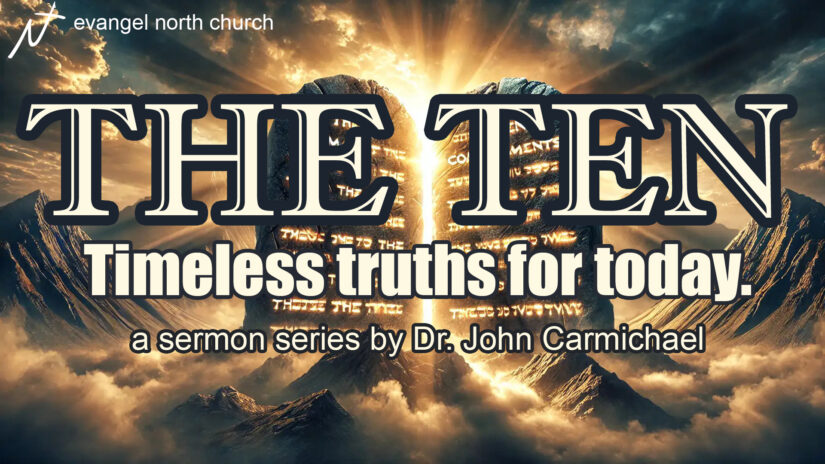A Holy Time-Out
The Ten: A Holy Time-Out – Understanding the Sabbath in Our Lives
Introduction
In our fast-paced, ever-demanding world, the concept of rest seems almost foreign. The pressure to always be productive, to achieve more, and to keep pushing forward often leaves us exhausted, burnt out, and spiritually depleted. However, Scripture presents a different rhythm—one of work and rest. The Sabbath, a divinely instituted time-out, stands as a command, a gift, and a necessity for believers.
In The Ten: A Holy Time-Out, Dr. John Carmichael explores the importance of the Sabbath, its biblical foundation, and its practical application in our lives today. Through a thorough study of Exodus 20:8-11, alongside other scriptural references, this blog will delve into why the Sabbath is essential, how we should observe it, and what it means for our spiritual and physical well-being.
—
I. What Is the Sabbath?
The Sabbath is not just an Old Testament ritual or a suggestion for those who feel overwhelmed—it is a command given by God. The word “Sabbath” means “rest,” and it is deeply rooted in God’s own example during Creation.
1. A Divine Command
God commanded His people to “remember the Sabbath day, to keep it holy” (Exodus 20:8). This was not an optional practice but an integral part of their covenant with Him. By keeping it holy—setting it apart for divine purposes—believers demonstrate obedience and trust in God.
2. A Gift from God
Jesus reinforced this principle when He said, “The Sabbath was made for man, and not man for the Sabbath” (Mark 2:27). This statement highlights that the Sabbath was designed as a blessing, not a burden. It is God’s provision for rest, renewal, and worship.
3. A Day of Worship, Mercy, and Rest
The Sabbath serves multiple purposes:
Worship – It is a day dedicated to glorifying God, assembling with fellow believers, and growing spiritually.
Mercy – Jesus performed numerous miracles on the Sabbath, emphasizing that acts of kindness and healing are aligned with its purpose.
Rest – A time to pause from work, reflecting on God’s goodness and allowing physical and mental restoration.
—
II. How Should We Observe the Sabbath?
Observing the Sabbath involves more than merely taking a break from work. It is a practice that encompasses work, worship, rest, and trust.
1. First, We Must Work
Before we can truly appreciate rest, we must understand the value of work. The Bible emphasizes the importance of labor:
“Six days you shall labor and do all your work” (Exodus 20:9).
“The Lord God took the man and put him into the garden of Eden to cultivate it and keep it” (Genesis 2:15).
“If anyone is not willing to work, then he is not to eat, either” (2 Thessalonians 3:10).
Sabbath observance does not negate the necessity of hard work. Instead, it creates a sacred rhythm: work diligently for six days and set aside one day to focus on God and renewal.
2. Second, We Must Worship
The Sabbath belongs to God. Leviticus 23:3 refers to it as “a holy convocation,” signifying a time of gathering and worship. Jesus Himself honored the Sabbath by attending the synagogue (Luke 4:16).
The New Testament encourages believers not to neglect assembling together (Hebrews 10:23-25). Worshiping as a community strengthens faith, fosters accountability, and glorifies God.
3. Third, We Must Rest
Rest is an essential component of the Sabbath. Exodus 20:10 states, “In it you shall not do any work.” This command extends beyond personal rest to include family, employees, and even animals, emphasizing a universal principle of renewal.
Thomas Watson, a Puritan theologian, once said, “To do servile work on the Sabbath shows an irreligious heart, and greatly offends God.” Resting is not laziness; it is obedience. Jesus Himself modeled rest (Mark 4:38), reminding us that physical and spiritual restoration are necessary.
Resting on the Sabbath:
Restores our bodies – Allowing time for recuperation improves physical health.
Renews our minds – Stepping away from work provides mental clarity.
Refreshes our spirits – Spending time in prayer, worship, and reflection draws us closer to God.
4. Fourth, We Must Trust God
One of the greatest challenges in observing the Sabbath is trusting God to sustain us. Ceasing work for a day may seem impractical, but it is an act of faith. By prioritizing worship and rest, we declare that God is our provider.
Jesus performed seven miracles on the Sabbath, demonstrating God’s power and provision:
1. Healing Simon Peter’s mother-in-law.
2. Healing a man with a withered hand.
3. Healing a man born blind.
4. Healing a crippled woman.
5. Healing a man with dropsy.
6. Healing a lame man by the pool of Bethesda.
7. Delivering a demon-possessed man.
Observing the Sabbath creates space for God to work miracles in our lives. It is an opportunity to pause, surrender our worries, and receive His blessings.
—
III. Why Should We Observe the Sabbath?
The Sabbath is more than a day of rest; it carries profound theological significance.
1. Reflecting God’s Example
Genesis 2:2-3 states, “By the seventh day God completed His work which He had done, and He rested on the seventh day.” God, who does not grow weary, chose to rest. This established a divine pattern for His creation.
Just as work is good because God works, rest is good because God rests. Observing the Sabbath aligns us with His design.
2. Remembering Redemption
Deuteronomy 5:15 connects the Sabbath to Israel’s deliverance from slavery: “You shall remember that you were a slave in the land of Egypt, and the Lord your God brought you out.”
For Christians, this points to our ultimate redemption through Jesus Christ. Hebrews 4:9-10 speaks of a “Sabbath rest for the people of God,” reminding us that our eternal rest is in Christ.
3. Honoring the Lord’s Day
The early church transitioned from a Saturday Sabbath to Sunday worship, known as “The Lord’s Day.” This shift commemorated Jesus’ resurrection (John 20:19; Acts 20:7; 1 Corinthians 16:2).
Although the specific day may differ, the principle remains: setting apart time for worship and rest. Throughout history, various Christian traditions, including daily Mass in Catholicism and midweek services in Protestantism, have upheld this practice.
4. Finding Rest in Christ
While Sabbath-keeping is a discipline, it does not save us. True rest is found in Jesus. Matthew 11:28 records His invitation: “Come to Me, all who are weary and heavy-laden, and I will give you rest.”
Taking a Sabbath is a reminder of this greater truth. As we pause from our labor, we remember that Christ has already accomplished the greatest work—our salvation.
—
Conclusion
God established the Sabbath as a time of rest, worship, and renewal. In a culture that glorifies busyness, reclaiming this practice is an act of faith and obedience. By observing the Sabbath, we align ourselves with God’s design, honor His command, and experience His provision.
As The Ten: A Holy Time-Out reminds us, setting aside time for worship and rest is not about legalism—it is about relationship. Whether on Saturday, Sunday, or another designated day, the principle remains: pause, reflect, and trust in the Lord.
The Sabbath is a gift. Will you accept it?

Get your copy of Jesus Heals You today.
https://a.co/d/4bn9I6x





